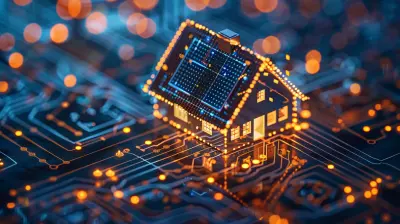Can 5G Really Replace Traditional Broadband?
30 October 2025
In the fast-moving world of technology, it’s almost impossible not to hear about 5G. From TV commercials to tech conferences, everyone seems to be talking about it. Some say it’s the holy grail of wireless connectivity. Others claim it might even replace traditional broadband. But hold on—can 5G really do that?
Let’s break it down, debunk some myths, and look at the real potential 5G holds. Can it truly stand toe-to-toe with your fiber or cable internet? Or is all this hype just a high-speed mirage?
What Exactly Is 5G?
Before we dive into comparisons, let’s cover the basics. 5G, simply put, is the fifth generation of mobile networks. It’s the successor to 4G LTE and promises faster speeds, lower latency, and the ability to connect more devices at once.Picture this: You’re downloading a full HD movie, and it’s done in under 10 seconds. Or maybe you’re video calling in 4K without a stutter. That’s what 5G aims to deliver.
But speed isn’t its only claim to fame. 5G is built to power entire smart cities, autonomous vehicles, and the ever-growing Internet of Things (IoT).
Sounds futuristic, right? But does it have what it takes to kick traditional broadband to the curb? Let’s find out.
Traditional Broadband: A Reliable Old Friend
Traditional broadband includes connections like DSL, cable, and fiber-optic. It’s been the go-to standard for home and business internet for years. Why? Because it delivers:- Stable high-speed connections
- Unlimited data (in most cases)
- Strong performance for streaming, gaming, and remote work
Fiber, in particular, offers blazing-fast, symmetrical speeds that are hard to beat. If you've got fiber running into your home, you've likely experienced internet nirvana.
But even then, it’s not all perfect. Installation can be a pain. In rural or remote areas, availability drops dramatically. And let’s not even talk about customer service from some ISPs…
The Case for 5G as a Broadband Replacement
Alright, now let’s flip the coin. Why are experts and enthusiasts so excited about 5G replacing broadband?1. Speed That Rivals Fiber
One of the biggest selling points of 5G is speed. In ideal conditions, 5G can deliver speeds of 1 to 10 Gbps. That’s on par with, and sometimes faster than, many fiber connections.But here’s the catch—those are ideal conditions. In real-world tests, speeds vary wildly depending on your location, the provider, and even the time of day. Still, the potential is there, and it’s pretty amazing.
2. No Wires, No Hassle
Let’s face it—no one likes dealing with messy cables or waiting for a technician to drill holes in the wall. With 5G home internet, all you need is a router or modem that picks up the 5G signal. It’s practically plug-and-play.Think of it like upgrading your Wi-Fi without the drama. You get internet through the airwaves, no digging required.
3. Great for People on the Move
If you live in an RV, travel frequently, or just hate being tied down to one location, 5G is your dream come true. Traditional broadband can’t go with you. 5G? It follows you wherever the signal goes.This opens up new lifestyle choices. Want to live by the beach one month and in the mountains the next? If there’s 5G coverage, you’ve got fast internet in your backpack.
The Challenges Holding 5G Back
Now, before we start dancing on broadband’s grave, let's pump the brakes. 5G isn’t without its faults. It has some growing up to do.1. Coverage Is Still Spotty
Here’s the brutal truth: 5G isn’t everywhere yet. In cities, sure—you might get blazing-fast mmWave 5G. But in the suburbs or countryside? You might get low-band 5G, which is closer to 4G speeds.Even within cities, the signal can drop depending on how many buildings or trees are around. 5G’s highest speeds (mmWave) have terrible range and can’t penetrate walls well. So for now, it’s not always reliable indoors.
2. Limited Data Caps
Most mobile plans, including 5G, come with data limits. Even if it says “unlimited,” there are usually speed throttles after a certain point.Compare that to broadband, where truly unlimited plans are common. For gamers, streamers, or large families chewing through terabytes of data, this can be a deal-breaker.
3. Latency and Reliability Issues
While 5G boasts ultra-low latency on paper (as low as 1 ms), in practice, it’s not quite there yet—especially in congested areas.Traditional broadband, particularly fiber, still has the edge when it comes to rock-solid reliability and consistency.
So, Can 5G Really Replace Broadband?
Here’s the million-dollar question. Is 5G ready to fully replace broadband?The answer? Not quite… yet.
We’re not saying it never will. 5G has phenomenal potential, and in certain scenarios, it can absolutely function as a broadband replacement. For example:
✅ You live in an area with spotty or no wired broadband options
✅ You're constantly on the move and want internet wherever you go
✅ You don’t need ultra-low latency for high-stakes gaming or video production
✅ Your data needs are moderate (basic streaming, emails, browsing)
But if you:
❌ Need ultra-stable gigabit internet for a smart home packed with devices
❌ Work from home and rely on video conferencing without hiccups
❌ Game online competitively or stream in 4K regularly
❌ Use several connected devices at once without lag
…then traditional broadband might still be your best bet for now.
Hybrid Future: The Best of Both Worlds
Here’s a wild idea—maybe it’s not about replacing but complementing.5G doesn't have to kill off broadband. In fact, the future might be hybrid. Maybe you’ll use broadband at home and 5G when you’re out and about. Or maybe rural communities will finally get reliable internet thanks to 5G, while cities continue building fiber networks.
It’s like having both a scooter and a car. Different tools for different tasks, right?
The Tech Is Racing Forward
Let’s not forget—5G is still in its early days. The rollout is ongoing, and technology is improving fast. Hardware costs are dropping. Routers are getting smarter. Satellite-backed 5G solutions are being tested. Every year, we see major steps forward.Within a few years, we might be laughing at how limited things were in the 2020s. Think of how far we’ve come from dial-up days. Remember that screeching sound of a modem connecting? Yeah, we’re not going back there.
What Should You Do Now?
If you’re considering switching to 5G for your home internet, here’s what you should do:1. Check Coverage – Use your provider's coverage map to see if you're within the strong signal area.
2. Review Data Limits – Understand how much data you actually use each month and if a mobile plan will support that.
3. Test It Out – Many companies offer free trial periods for 5G home internet. Give it a spin before you fully commit.
4. Compare Costs – 5G might be cheaper than wired internet, especially if you're already paying for a mobile plan.
Final Thoughts: A Bright, Balanced Future
So, can 5G really replace traditional broadband? The honest answer is: for some people, yes. For others, not just yet.We’re in a transformational era where technology is blurring the lines between fixed and mobile connectivity. 5G brings flexibility, speed, and a taste of what the future holds. And while it might not totally dethrone broadband today, it’s definitely shaking things up.
Think of it as not just a replacement, but an evolution—a new chapter in how we stay connected in an increasingly digital world.
Whether you're a tech enthusiast, a remote worker, or someone stuck with snail-speed DSL, the arrival of 5G is a reason to be excited. The internet is becoming more mobile, more accessible, and more powerful.
And that? That’s something worth cheering for.
all images in this post were generated using AI tools
Category:
5g TechnologyAuthor:

Reese McQuillan
Discussion
rate this article
1 comments
Patience Robinson
Great article! It's exciting to see the potential of 5G shaping our connectivity future. While it's clear that 5G offers innovative benefits, let's keep exploring how it can complement traditional broadband to ensure everyone has access to reliable, high-speed internet. The tech landscape is evolving, and so are our opportunities!
November 2, 2025 at 12:48 PM

Reese McQuillan
Thank you for your thoughtful comment! I completely agree—5G and traditional broadband can complement each other to enhance connectivity for all. Exciting times ahead!


